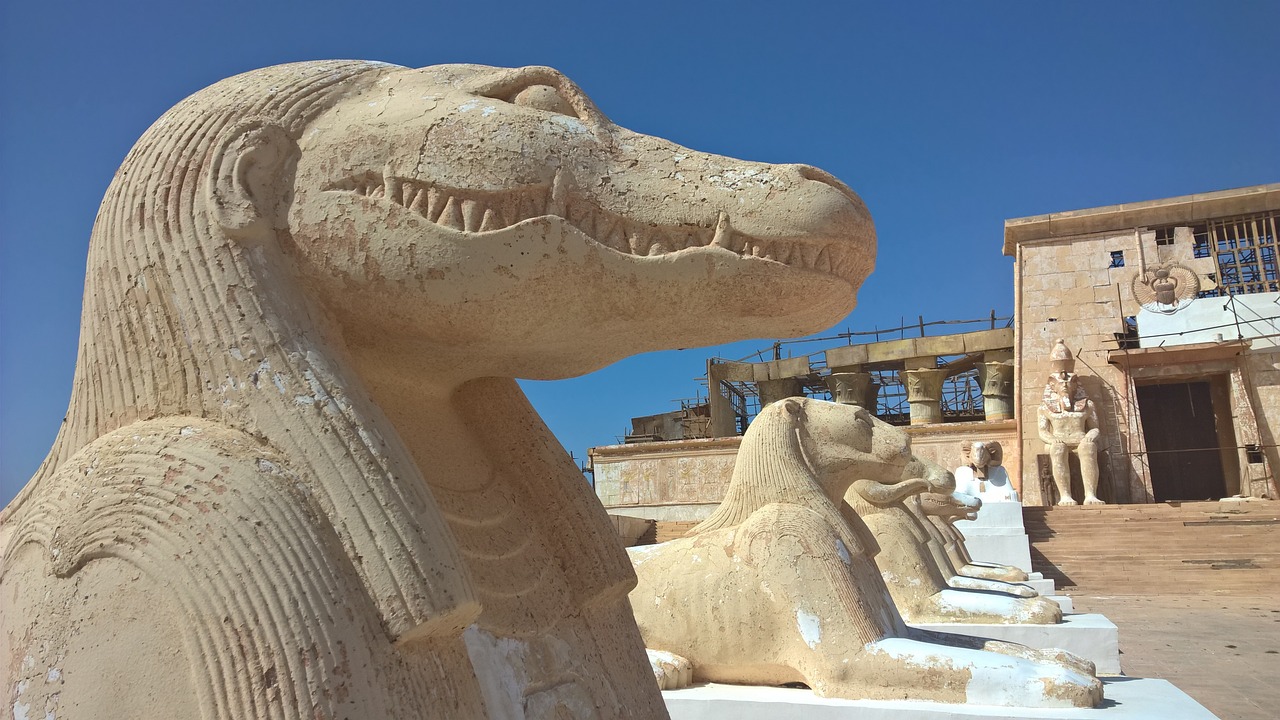Cleopatra: The Last Pharaoh of Egypt
An exploration of the life and reign of Cleopatra, the iconic queen of ancient Egypt, known for her intelligence, beauty, and political prowess that shaped the fate of Egypt during her rule.
Cleopatra, the enigmatic ruler of Egypt, captivates us with her remarkable story that transcends time. Her journey from a young princess to the powerful pharaoh of one of the greatest civilizations in history is a tale of intrigue, ambition, and love.
Born into the Ptolemaic dynasty, Cleopatra's early life was steeped in political turmoil and familial strife. Despite the challenges she faced, her intelligence and determination set her apart, eventually leading to her ascension to the throne of Egypt at a tender age.
One of the most intriguing chapters of Cleopatra's life was her relationship with Julius Caesar, the influential Roman general. Their union not only sparked a passionate romance but also reshaped the political landscape of both Egypt and Rome, forging alliances that would have far-reaching consequences.
Following Caesar's assassination, Cleopatra's alliance shifted to Mark Antony, another prominent figure in Roman politics. Together, they faced the forces of Octavian in the fateful Battle of Actium, a clash that would seal their tragic fate and mark the end of an era.
Beyond her political acumen, Cleopatra was a patron of the arts and architecture, contributing to the cultural richness of Egypt. Her support for literature and monumental projects left a lasting legacy that continues to inspire awe and admiration.
Despite her accomplishments, Cleopatra's legacy is often shrouded in myth and misconception. Separating fact from fiction, we uncover the true essence of this formidable ruler, whose intelligence and charisma left an indelible mark on history.
The circumstances surrounding Cleopatra's death remain a subject of debate and speculation. Her demise marked the end of an era for Egypt and the beginning of a new chapter in the annals of the Roman Empire, forever altering the course of history.
Cleopatra's influence reverberates through the centuries, her diplomatic strategies and political savvy serving as a blueprint for powerful women in leadership. Her ability to navigate treacherous waters with grace and determination cements her place as a legendary figure in the tapestry of time.
In a world where myth often overshadows reality, Cleopatra stands as a beacon of strength and resilience, a testament to the enduring power of female leadership. Her story transcends boundaries, inspiring generations to come with her unwavering spirit and unwavering resolve.

Early Life and Ascension to the Throne
An exploration of the life and reign of Cleopatra, the iconic queen of ancient Egypt, known for her intelligence, beauty, and political prowess that shaped the fate of Egypt during her rule.
Cleopatra, born in 69 BC, was a member of the Ptolemaic dynasty, a Greek royal family ruling Egypt. Her father, Ptolemy XII, faced internal conflicts and was exiled, leaving Cleopatra and her brother, Ptolemy XIII, to share the throne. However, Cleopatra's ambition and intellect surpassed her brother's, leading to a power struggle that ultimately resulted in her becoming the sole ruler of Egypt at the young age of 18.
Despite her youth, Cleopatra proved to be a formidable leader, fluent in multiple languages and well-versed in politics and diplomacy. Her early years on the throne were marked by challenges, including economic turmoil and external threats from the Roman Empire, which sought to exert influence over Egypt.
With her sharp wit and strategic acumen, Cleopatra navigated these turbulent waters, solidifying her position as a capable and visionary ruler. Her ability to charm and negotiate with foreign powers earned her a reputation for cunning and resourcefulness, qualities that would define her reign and legacy.
As Cleopatra's influence grew, she embarked on a mission to restore Egypt's former glory and independence. Through a combination of political alliances, economic reforms, and cultural revitalization, she sought to strengthen her kingdom and secure its place on the world stage.
The circumstances of Cleopatra's ascension to the throne were not only a testament to her determination and resilience but also a reflection of the complex political landscape of ancient Egypt. Her early life and rise to power set the stage for the remarkable reign that would follow, shaping the destiny of Egypt and leaving an indelible mark on history.

Relationship with Julius Caesar
When it comes to Cleopatra's relationship with Julius Caesar, it was a pivotal alliance that not only shaped her reign but also influenced the dynamics between Egypt and Rome. Cleopatra, known for her intelligence and charm, captivated Julius Caesar, the powerful Roman general, during his visit to Egypt. Their relationship went beyond mere political strategy, evolving into a passionate romance that raised eyebrows in both Egypt and Rome.
Julius Caesar's support was instrumental in securing Cleopatra's hold on the Egyptian throne, as he helped her regain power after a period of exile. Together, they navigated the complexities of Egyptian politics and Roman interests, forging a bond that defied conventional norms of the time. Cleopatra's wit and charisma complemented Julius Caesar's military prowess, creating a formidable partnership that aimed to strengthen both Egypt and Rome.
Their union resulted in the birth of Cleopatra's son, Caesarion, who was believed to be Julius Caesar's child. This further solidified their connection and hinted at a potential heir to both Egyptian and Roman legacies. However, Julius Caesar's assassination in 44 BC marked a turning point in Cleopatra's life, forcing her to navigate the uncertain waters of Roman politics without her powerful ally by her side.
Despite Julius Caesar's death, Cleopatra's relationship with him left a lasting impact on her reign and the perception of her rule. It showcased her ability to form strategic alliances and leverage her personal connections for the benefit of Egypt. The bond between Cleopatra and Julius Caesar remains a prominent chapter in the history of ancient Egypt, illustrating the intricate interplay between love, power, and politics in the ancient world.

Mark Antony and the Battle of Actium
Mark Antony, a prominent Roman triumvir, played a significant role in Cleopatra's life and the fate of Egypt. Their alliance not only sparked a passionate romance but also had far-reaching consequences on the political landscape of the ancient world. The Battle of Actium stands out as a pivotal moment in their relationship, where the forces of Mark Antony and Cleopatra clashed with those of Octavian, later known as Augustus Caesar.
The Battle of Actium, fought in 31 BC, marked the culmination of the power struggle between Octavian and Mark Antony for control over the Roman Republic. Cleopatra's involvement in supporting Mark Antony further intensified the conflict, leading to a decisive naval engagement off the coast of Greece. The outcome of this battle would determine the future of Egypt and Rome, shaping the course of history for years to come.
As the forces of Octavian closed in on Mark Antony and Cleopatra's fleet, the legendary queen made a fateful decision to retreat, a move that ultimately sealed their defeat. The defeat at the Battle of Actium marked the end of Mark Antony's ambitions and paved the way for Octavian to become the sole ruler of Rome, ushering in the era of the Roman Empire.
The aftermath of the Battle of Actium was filled with tragedy and upheaval. Mark Antony and Cleopatra faced defeat and chose to end their lives rather than fall into the hands of their enemies. Their deaths marked the end of an era and the beginning of a new chapter in the history of Egypt and Rome.

Cultural and Architectural Contributions
When delving into the realm of Cleopatra's legacy, one cannot overlook her significant cultural and architectural contributions to ancient Egypt. Cleopatra's reign was not only marked by political intrigue and power struggles but also by a deep appreciation for the arts and architecture that defined her era.
As a patron of the arts, Cleopatra played a pivotal role in fostering creativity and intellectual pursuits in Egypt. She supported renowned scholars, poets, and artists, creating a vibrant cultural scene that flourished under her rule. The royal court of Cleopatra became a hub of innovation and artistic expression, attracting talents from far and wide.
One of Cleopatra's most notable architectural endeavors was her ambitious projects to restore and enhance Egypt's iconic monuments and structures. She dedicated resources to the preservation of ancient temples, the construction of new monuments, and the beautification of cities across the kingdom.
Moreover, Cleopatra's influence extended beyond the borders of Egypt, as she actively promoted cultural exchange and collaboration with other civilizations. Her court welcomed foreign artists, architects, and thinkers, fostering a rich tapestry of ideas and influences that enriched the artistic landscape of the time.
Through her patronage of the arts and her architectural endeavors, Cleopatra left a lasting imprint on Egyptian culture and heritage. Her legacy as a ruler who valued creativity and intellectual pursuits continues to inspire admiration and fascination to this day.

Legacy and Historical Depictions
An exploration of the life and reign of Cleopatra, the iconic queen of ancient Egypt, known for her intelligence, beauty, and political prowess that shaped the fate of Egypt during her rule.
As the last pharaoh of Egypt, Cleopatra left behind a legacy that continues to captivate historians, artists, and storytellers alike. Her image has been immortalized in various forms, from ancient artifacts to modern films, each interpretation adding a layer to her enigmatic persona.
Cleopatra's historical depictions often oscillate between reverence and vilification, showcasing the complexity of her character. Some portray her as a seductress who used her charm to influence powerful men, while others highlight her diplomatic acumen and strategic brilliance in navigating the turbulent political landscape of her time.
Throughout history, Cleopatra has been a symbol of female power and resilience, challenging traditional gender roles and defying societal expectations. Her intelligence and wit have inspired countless works of art and literature, cementing her status as a timeless icon of strength and beauty.
Despite the passage of centuries, Cleopatra's legacy endures, serving as a reminder of the indelible mark she left on the ancient world. Her story continues to fascinate audiences worldwide, sparking debates and discussions about her true nature and the impact of her rule on Egypt and beyond.
Whether viewed as a tragic heroine or a cunning ruler, Cleopatra's historical depictions offer a glimpse into the multifaceted personality of a woman who defied conventions and reshaped the course of history with her intelligence, charm, and unwavering determination.

Death and Aftermath
After the tumultuous events surrounding the Battle of Actium, Cleopatra's fate took a tragic turn. Faced with the imminent defeat of her forces, the legendary queen made a fateful decision. Rather than risk falling into the hands of her enemies, Cleopatra chose to end her own life. The circumstances of her death remain shrouded in mystery and intrigue, with conflicting accounts of whether she succumbed to the bite of an asp or used another method to meet her end.
The aftermath of Cleopatra's demise reverberated throughout the ancient world. With her death, Egypt fell under the control of the Roman Empire, marking the end of an era for the once-great civilization. The loss of Cleopatra dealt a significant blow to Egypt's independence and cultural identity, as the country became a mere province of Rome.
For Rome, Cleopatra's death marked the consolidation of power under the rule of Octavian, who later became Emperor Augustus. The demise of the last pharaoh of Egypt solidified Rome's dominance in the Mediterranean region and paved the way for the establishment of the Roman Empire. The legacy of Cleopatra endured through the annals of history, immortalizing her as a symbol of beauty, intelligence, and political acumen.

Historical Significance and Influence
When delving into the historical significance and influence of Cleopatra, one cannot overlook the profound impact she had on the political landscape of her time. Cleopatra's strategic prowess and diplomatic acumen allowed her to navigate the complex web of alliances and rivalries that defined the ancient world. Through her alliances with powerful figures such as Julius Caesar and Mark Antony, Cleopatra not only secured her own reign but also influenced the course of history.
Her ability to assert her authority in a male-dominated world challenged traditional gender roles and paved the way for future generations of powerful women. Cleopatra's legacy as a formidable leader continues to inspire admiration and fascination, serving as a testament to the enduring influence of women in positions of power.
Moreover, Cleopatra's cultural contributions played a significant role in shaping Egypt's artistic and architectural landscape. Her patronage of the arts promoted creativity and innovation, leading to a flourishing of literature, sculpture, and monumental architecture. The iconic monuments and temples commissioned by Cleopatra stand as a testament to her enduring influence on Egyptian culture and heritage.
Despite the passage of centuries, Cleopatra's legacy remains a subject of scholarly debate and popular imagination. The enigmatic queen continues to captivate the minds of historians, artists, and storytellers, with her story serving as a source of inspiration and intrigue. By examining Cleopatra's life and reign, we gain valuable insights into the complexities of power, ambition, and legacy that transcend time and place.

Myth vs. Reality
An exploration of the life and reign of Cleopatra, the iconic queen of ancient Egypt, known for her intelligence, beauty, and political prowess that shaped the fate of Egypt during her rule.
Details of Cleopatra's upbringing, her family background, and the circumstances that led to her becoming the ruler of Egypt at a young age.
Insights into Cleopatra's alliance and romance with Julius Caesar, the powerful Roman general, and the impact of their relationship on both Egypt and Rome.
A look at Cleopatra's partnership with Mark Antony, the Roman triumvir, and the dramatic events surrounding the Battle of Actium that sealed their fate.
Exploration of Cleopatra's patronage of arts, literature, and architecture, including her role in preserving and enhancing Egypt's cultural heritage.
Discussion on the enduring legacy of Cleopatra in history, literature, and popular culture, and the various ways in which she has been portrayed over the centuries.
Account of the circumstances leading to Cleopatra's tragic death, the aftermath of her demise, and the implications for the future of Egypt and the Roman Empire.
Analysis of Cleopatra's impact on the political landscape of her time, her diplomatic strategies, and her lasting influence on the perception of powerful women in history.
Throughout history, Cleopatra has been shrouded in myths and legends, often portrayed as a seductress who used her charm to manipulate powerful men. However, the reality is far more complex. Cleopatra was a skilled diplomat and ruler, fluent in multiple languages and well-versed in politics. She was not just a beauty, but a formidable leader who navigated the treacherous waters of ancient power struggles with intelligence and cunning.
Frequently Asked Questions
- Who was Cleopatra?
Cleopatra was the last active ruler of the Ptolemaic Kingdom of Egypt, known for her intelligence, beauty, and political acumen.
- How did Cleopatra rise to power?
Cleopatra ascended to the throne of Egypt after the death of her father, Ptolemy XII, and initially ruled alongside her younger brother, Ptolemy XIII.
- What was Cleopatra's relationship with Julius Caesar?
Cleopatra had a romantic relationship with Julius Caesar, which not only solidified her grip on the throne but also influenced Roman politics.
- Who was Mark Antony and how was he connected to Cleopatra?
Mark Antony was a Roman general and one of the three members of the Second Triumvirate. He allied with Cleopatra and fathered children with her.
- What was the Battle of Actium, and how did it impact Cleopatra?
The Battle of Actium was a decisive naval battle where Octavian's forces defeated those of Cleopatra and Mark Antony, leading to their downfall.
- What is Cleopatra's legacy?
Cleopatra's legacy includes her contributions to art, literature, and architecture, as well as her lasting influence on the perception of powerful women in history.
- How did Cleopatra die?
Cleopatra died by suicide, traditionally by the bite of an asp, following the defeat of her forces by Octavian.
- What are some common misconceptions about Cleopatra?
Many myths surround Cleopatra, often portraying her as a seductress, but historical evidence suggests she was a skilled ruler and diplomat.



















